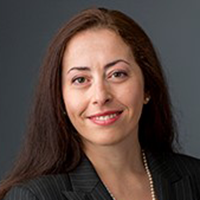Must a female scientist be ambitious?
I recently was chatting with a colleague about a leadership position that opened up at her institution. “You should apply!” I urged her, sensing an opportunity. My friend was hesitant; she didn’t think she was ready or qualified.
A few days later, we talked again. My friend looked at her professional accomplishments and compared them to those of people who typically hold this leadership position. Of course, she had the prerequisite experience to apply. She still didn’t think she was ready, however, and thought she needed to participate in leadership training through her professional society. This is a known phenomenon — women think they need to be perfectly qualified for the positions they seek, whereas men are less picky about their own credentials for the job.

After I became a tenure-track professor, I started seeking out leadership positions at my institution because I wanted to create opportunities for students. For example, I established the first American Society for Biochemistry and Molecular Biology undergraduate Student Chapter on my campus. After I achieved tenure, I had to use my voice to advocate for the professional interests of my colleagues. I was elected to the university faculty council and eventually became the chair of my academic division. Currently, I am the dean of the graduate school at my institution and a member of the Women in Biochemistry and Molecular Biology Committee of the ASBMB, working to promote and support the careers of women.
When I started sitting at the leadership table, I noticed that there still are fewer women at that table than men. At my current institution, I am the first female dean of my academic unit. Things are getting better, just not fast enough.
We still need to remove barriers that make science careers more challenging for women than men. Women now have equal access to undergraduate and graduate science education, but still there are fewer female than male assistant professors, and the disparity grows as you look up the career ladder. At senior leadership levels in the academy, men greatly outnumber women as department chairs, center directors, deans, provosts and presidents. One question we sometimes hear asked is whether women are just not as ambitious as men.
Looking around academic institutions and professional organizations, I see clearly that many women are ambitious and willing to pursue leadership opportunities. Women increasingly are elected as provosts and presidents of universities and chosen to lead professional and scientific societies. However, we also have to recognize that different women may have different ambitions and goals.
For many of my female colleagues, considering the careers of their spouses, the school choices of their children and proximity to extended family may eclipse any of the benefits of pursuing greater leadership opportunities or other forms of career advancement. We need to accept that women may have motivations beyond achievements in the workplace and that career achievements may be secondary to work–life integration.
Professional ambition comes with a price. Aggressively climbing the career ladder is difficult, and as the expression goes, it is lonely at the top. For example, when I became dean, I couldn’t continue to be what I think of as a regular scientist and walk into my colleagues’ offices to chat about an idea — apparently, some faculty members find it somewhat alarming when the dean enters their office unannounced.
Leadership requires constant decision making and risk taking, which can exact an emotional toll and affect your overall well-being. We need to encourage women who are ambitious, but we want to create networks and systems that will provide support and feedback and will identify women as successful when they achieve their own professional goals.
Enjoy reading ASBMB Today?
Become a member to receive the print edition four times a year and the digital edition monthly.
Learn moreFeatured jobs
from the ASBMB career center
Get the latest from ASBMB Today
Enter your email address, and we’ll send you a weekly email with recent articles, interviews and more.
Latest in Opinions
Opinions highlights or most popular articles

Women’s health cannot leave rare diseases behind
A physician living with lymphangioleiomyomatosis and a basic scientist explain why patient-driven, trial-ready research is essential to turning momentum into meaningful progress.

Making my spicy brain work for me
Researcher Reid Blanchett reflects on her journey navigating mental health struggles through graduate school. She found a new path in bioinformatics, proving that science can be flexible, forgiving and full of second chances.

The tortoise wins: How slowing down saved my Ph.D.
Graduate student Amy Bounds reflects on how slowing down in the lab not only improved her relationship with work but also made her a more productive scientist.

How pediatric cataracts shaped my scientific journey
Undergraduate student Grace Jones shares how she transformed her childhood cataract diagnosis into a scientific purpose. She explores how biochemistry can bring a clearer vision to others, and how personal history can shape discovery.

Debugging my code and teaching with ChatGPT
AI tools like ChatGPT have changed the way an assistant professor teaches and does research. But, he asserts that real growth still comes from struggle, and educators must help students use AI wisely — as scaffolds, not shortcuts.

AI in the lab: The power of smarter questions
An assistant professor discusses AI's evolution from a buzzword to a trusted research partner. It helps streamline reviews, troubleshoot code, save time and spark ideas, but its success relies on combining AI with expertise and critical thinking.

